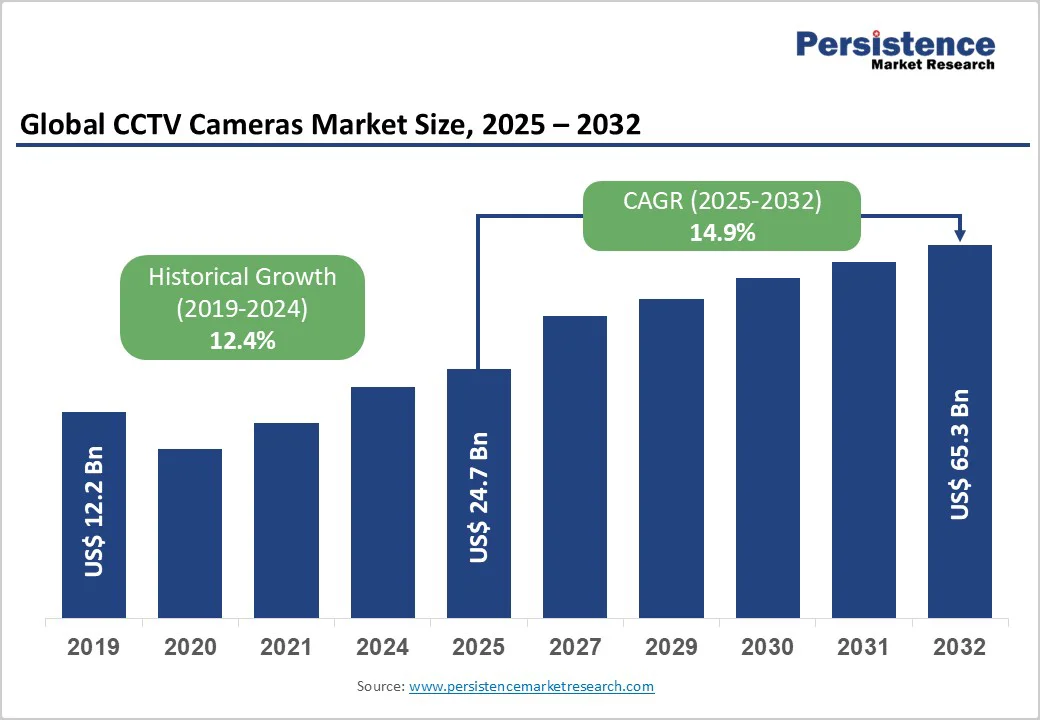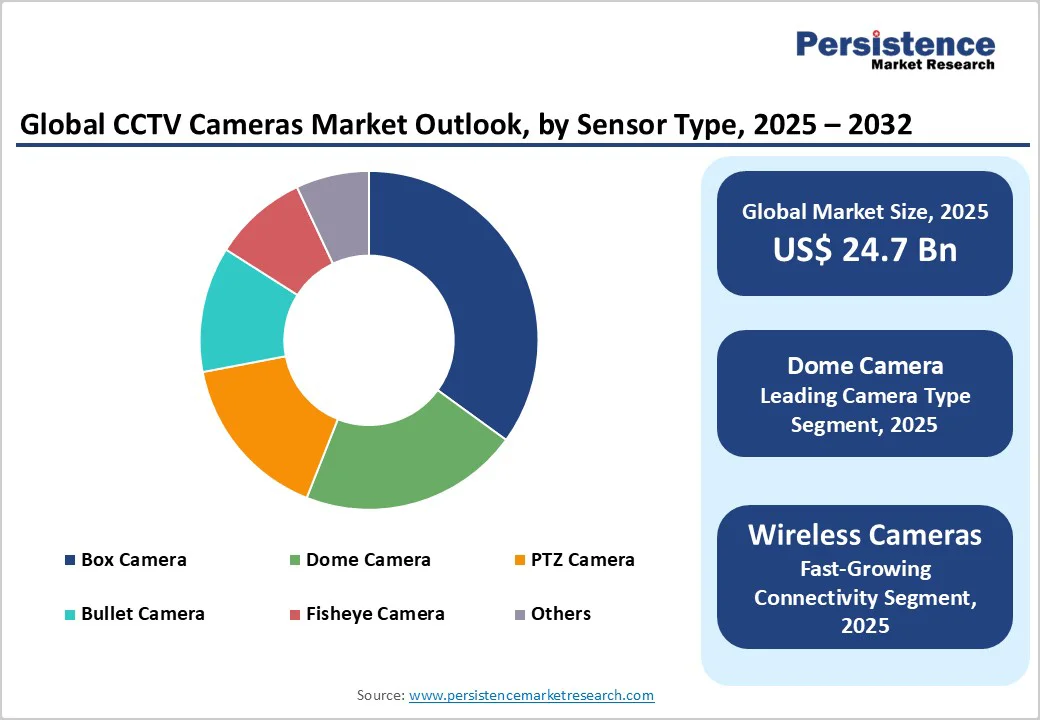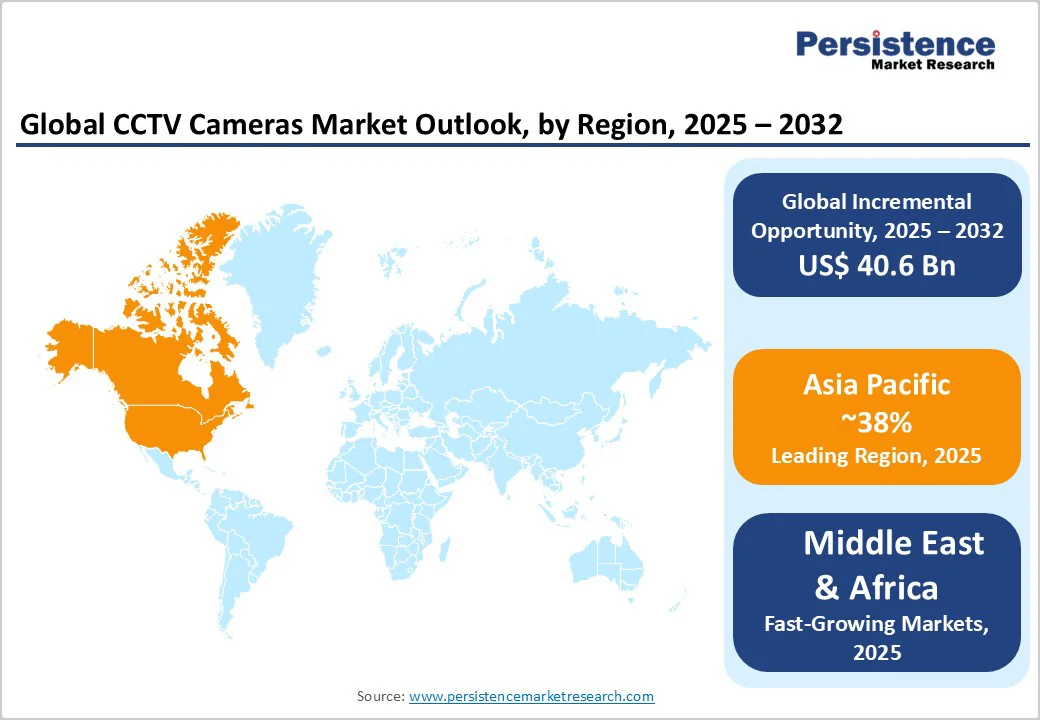ID: PMRREP21760| 186 Pages | 5 Nov 2025 | Format: PDF, Excel, PPT* | Semiconductor Electronics

The global CCTV cameras market size is likely to value at US$ 24.7 billion in 2025 and is projected to reach US$ 65.3 billion by 2032, growing at a CAGR of 14.9% between 2025 and 2032.
Heightened security concerns and stringent public safety regulations have accelerated the adoption of CCTV systems across commercial, industrial, and residential sectors.
Governments worldwide are investing heavily in smart city projects, mandating surveillance infrastructure for traffic management, critical infrastructure protection, and law enforcement, which has spurred large-scale deployments.
| Key Insights | Details |
|---|---|
| CCTV Cameras Market Size (2025E) | US$ 24.7 billion |
| Market Value Forecast (2032F) | US$ 65.3 billion |
| Projected Growth CAGR (2025 - 2032) | 14.9% |
| Historical Market Growth (2019 - 2024) | 12.4% |

Global crime rates and property theft have been on an upward trajectory, compelling both private enterprises and individual consumers to bolster surveillance measures. Mandatory installation of CCTV cameras in public spaces, transportation hubs, and government buildings has become standard practice under various national security directives.
Over one billion cameras were estimated to be operational worldwide in 2024, underlining the critical role of video surveillance in modern public safety frameworks. These regulations not only ensure widespread adoption but also guarantee recurring revenue for service providers through maintenance and cloud storage subscriptions.
The migration from analog CCTV systems to high-definition IP cameras has transformed the video surveillance landscape. IP-based cameras now account for over 40% of new installations, offering superior image quality, Power over Ethernet (PoE) convenience, and seamless integration with cloud platforms.
The advent of AI-driven analytics-encompassing real-time facial recognition, license plate reading (ANPR), object detection, and behavioral pattern analysis-has dramatically enhanced security outcomes. AI algorithms have reduced false-alert rates by up to 95%, enabling proactive threat management. The rollout of 5G networks is poised to further augment real-time video streaming capabilities, paving the way for scalable, low-latency surveillance solutions.
Growing awareness around personal privacy and stringent data protection laws-such as Europe’s GDPR and emerging Personal Data Protection Regulations (PDPR) in APAC-have imposed compliance challenges on CCTV providers. End-to-end encryption, secure data storage, and user consent management are now mandatory features, increasing development costs and implementation complexity.
Organizations often face substantial fines for non-compliance, which can deter smaller enterprises from deploying comprehensive CCTV networks.
While hardware costs have declined, the total cost of ownership (TCO) for extensive CCTV systems remains significant due to ongoing expenses namely bandwidth fees, cloud storage charges, software licensing, and maintenance contracts. For large multi-site implementations, annual connectivity and storage expenses can exceed US$ 100,000 per location, making return on investment (ROI) calculation critical.
Such high TCO poses a barrier for SMEs and entities in developing regions with limited security budgets.
The shift toward subscription-based Video Surveillance as a Service (VSaaS) models is gaining momentum, offering clients minimal upfront capital expenditure and scalable, cloud-hosted infrastructure. VSaaS is projected to grow at a 20% CAGR through 2030, driven by demand for remote accessibility, automatic software updates, and predictable OPEX structures.
Residential and small commercial segments are particularly benefitting from VSaaS solutions, which bundle hardware, software, and cloud storage into a single monthly fee.
More than 500 smart city initiatives globally are incorporating advanced CCTV networks integrated with IoT sensors, analytics platforms, and traffic management systems. Governments plan to invest over US$ 200 billion in urban digitization by 2030, driving demand for scalable, interoperable CCTV solutions.
Use cases extend beyond security to include environmental monitoring, crowd flow analysis during public events, and emergency response coordination, creating diverse revenue streams for surveillance providers.
Dome Cameras hold the largest share at approximately 35%, favored for their discreet footprint, vandal-resistant design, and suitability for both indoor and outdoor applications. The segment’s leadership is underpinned by robust demand in retail and hospitality sectors, where discreet surveillance is crucial. Enhanced features like 360° pan-tilt capabilities and embedded AI analytics for queue management have further solidified dome cameras’ dominance.
IP-based (High Resolution) cameras capture around 40% of the market, driven by the proliferation of high-speed networks and PoE infrastructure. These cameras offer 4K and higher resolutions, facilitating detailed facial recognition and forensic investigations. The ability to integrate seamlessly with cloud storage and VMS platforms, alongside advanced cybersecurity protocols, positions high-resolution IP cameras as the preferred choice for enterprise deployments.
IR/Night Vision technology leads with a 30% share, reflecting the indispensability of round-the-clock surveillance in sectors like transportation, utilities, and critical infrastructure. Infrared illumination combined with low-light sensors ensures clear imagery in complete darkness. Recent enhancements in IR range and low-power consumption have broadened adoption among residential and remote site deployments.
Government & Public Sector is the dominant end-use, comprising roughly 33% of installations. Municipal authorities, defense establishments, and law enforcement agencies deploy large-scale CCTV networks for border monitoring, public safety, and traffic oversight. Funding through defense and homeland security budgets ensures continuous procurement cycles and long-term service contracts.

North America maintains leadership through substantial investments in AI-based surveillance across corporate campuses, smart homes, and critical infrastructure. The U.S. accounts for over 60% of regional revenue, driven by federal funding for homeland security and stringent compliance standards in sectors like banking and healthcare.
Silicon Valley’s technology firms are pioneering edge-computing CCTV solutions that process video data locally, mitigating bandwidth constraints and enhancing cybersecurity through reduced cloud dependency.
Europe’s CCTV market is shaped by comprehensive data privacy regulations and initiatives for cross-border security cooperation. Germany and the U.K. are the largest contributors, deploying high-definition IP cameras in transportation hubs, industrial facilities, and urban centers.
France and Spain lead EU-supported smart city projects integrating AI analytics for crowd behavior monitoring at sports events and public gatherings. Harmonization of technical standards across the European Union is streamlining procurement and fostering interoperability.
The Asia Pacific region is experiencing exponential growth due to extensive infrastructure development in China, India, and Southeast Asia. Over 100 smart city projects in China alone are integrating AI-driven CCTV networks for traffic optimization and environmental monitoring.
India’s Smart Cities Mission has sanctioned deployments of advanced surveillance systems in over 40 cities by 2026. Japan’s focus on industrial automation is driving adoption of thermal imaging cameras for workplace safety, while ASEAN nations prioritize cost-effective wireless CCTV solutions for rural and remote surveillance.

The global CCTV Cameras Market exhibits a moderately consolidated structure, with leading players holding significant revenue shares while numerous smaller firms target niche segments. Major companies differentiate through continuous R&D investments in AI algorithms, edge-computing capabilities, and cybersecurity certifications.
Strategic collaborations with system integrators, telecom operators, and cloud providers are common strategies to expand solution ecosystems. Emerging business models include device-agnostic analytics platforms and white-label VSaaS offerings.
The CCTV market was valued at US$ 24.7 billion in 2025 and is forecast to reach US$ 65.3 billion by 2032 at a CAGR of 14.9%.
Rising crime rates, government smart city initiatives, and advancements in AI-powered video analytics drive market growth.
Dome Cameras lead with approximately 35% market share due to vandal resistance and AI integration.
Asia Pacific leads with about 38% share, bolstered by urbanization and local manufacturing.
AI-powered video analytics offers significant potential for real-time threat detection and predictive security.
Key players include Hangzhou Hikvision Digital Technology Co., Ltd. (China), Bosch Security Systems Inc. (Germany), and Axis Communications AB (Sweden).
| Report Attribute | Details |
|---|---|
| Historical Data/Actuals | 2019 - 2024 |
| Forecast Period | 2025 - 2032 |
| Market Analysis | Value: US$ Bn, Volume: As Applicable |
| Geographical Coverage |
|
| Segmental Coverage |
|
| Competitive Analysis |
|
| Report Highlights |
|
By Camera Type
By Connectivity
By Technology
By End-user
By Region
Delivery Timelines
For more information on this report and its delivery timelines please get in touch with our sales team.
About Author